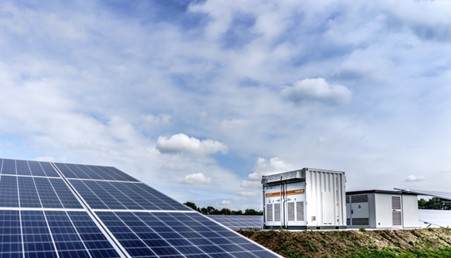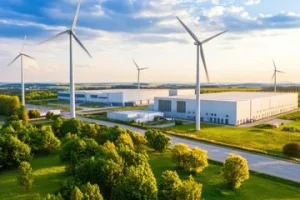How do we get to net-zero without sacrificing power, scale, or sustainability?
The Role of Hydrogen Power Plants in Achieving Net-Zero Emissions
In the race to reach net-zero emissions, the world is searching for energy sources that are clean, scalable, and reliable. Solar and wind? Absolutely essential. Nuclear power? Still a strong player. But there’s another contender rapidly gaining traction—and it just might be the missing piece in the clean energy puzzle: hydrogen power.
So, what exactly is a hydrogen power plant? It’s a facility that generates clean electricity by using pure hydrogen as fuel—either by burning hydrogen in gas turbines or by using fuel cells to convert it directly into power. When the hydrogen is produced from renewable energy like solar or wind, the entire process becomes zero-emissions. That’s green hydrogen, and it’s not science fiction—it’s already reshaping how we think about power generation.
Let’s explore how hydrogen is fueling a revolution in energy, and what makes it capable of delivering on the big promises of decarbonisation—without compromising on scale, cost, or reliability.
Green Hydrogen: Clean Fuel from Clean Sources
At the core of this new energy ecosystem is green hydrogen—created through electrolysis that splits water into hydrogen and oxygen, using electricity from renewable energy sources.
This isn’t just about “cleaner” fuel—it’s about completely eliminating carbon from the equation.
- Traditional hydrogen (grey) is made from natural gas and emits CO₂.
- Blue hydrogen tries to offset that with carbon capture.
- Green hydrogen? Zero emissions when produced—and zero emissions when used.
According to the IEA, green hydrogen could meet up to 20% of global energy demand by 2050. That’s not just hype—it’s potential, ready to be unlocked with scale, smart infrastructure, and the right tech.

PEM Electrolyzers: Precision for Modern Energy Systems
The future of hydrogen producers depends on innovation, and PEM (Proton Exchange Membrane) electrolyzers are leading the charge. These systems use solid exchange membranes to conduct hydrogen protons—no corrosive liquids required.
Here’s why PEM is a big deal:
- It works seamlessly with renewable energy like solar and wind.
- It handles fluctuations in power input (perfect for dynamic grids).
- It delivers high-purity, pressurized pure hydrogen, fast.
For fuel cell power plants, that level of precision and reliability is gold. It ensures consistent performance, regardless of external conditions. Whether you’re building a hydrogen-ready microgrid or a full-scale power plant, PEM tech is the go-to.
Solid Oxide Electrolyzers: Turning Industrial Heat into Clean Fuel
If PEM is about speed and flexibility, Solid Oxide Electrolysis Cells (SOECs) are about power and efficiency.
Operating at high temperatures (700–1,000°C), SOECs convert steam into hydrogen fuel with extraordinary energy efficiency—especially when paired with waste heat from existing industrial systems or nuclear power plants.
This makes them ideal for large-scale applications like:
- Integrated hydrogen systems at manufacturing plants
- Co-located systems with thermal power plants
- Future hybrid designs that recycle industrial energy loss
It’s about turning existing heat into hydrogen—and turning that hydrogen into scalable, dispatchable power.
Alkaline Electrolysis: Proven, Scalable, Reliable
Before we had PEM and SOEC, we had alkaline electrolysis—and it’s still holding strong, especially when affordability matters.
Alkaline systems:
- Use hydroxide ions to carry charge through a liquid electrolyte
- Are cost-effective to build and operate
- Are especially suited for large-scale hydrogen production in stable, utility-level environments
It might not be as responsive as PEM, but when you’re focused on producing 100% hydrogen in high volumes—alkaline is the dependable workhorse.
Fuel Cells, Storage & Power Plants: Completing the Clean Energy Circle
So what happens after you’ve created hydrogen?
You store it, and you use it—especially when the grid needs power the most.
- In a fuel cell power plant, hydrogen is fed into fuel cells to generate clean electricity, with water vapor as the only emission.
- Stored hydrogen can be tapped during energy shortages or peak loads, solving the energy storage problem renewables can’t fix alone.
- In hydrogen power plants, we’re seeing a shift toward hydrogen and natural gas blends, and even fully hydrogen-burning turbines.
This isn’t limited to lab trials. Countries are building hydrogen-ready gas plants and retrofitting existing infrastructure to run on cleaner blends. It’s a transition strategy that offers both impact and scalability.
As the global energy sector shifts toward clean energy, hydrogen power is emerging as a viable solution for decarbonizing power plants. Modern gas power plants are increasingly being retrofitted or built as hydrogen-ready facilities, capable of burning hydrogen or hydrogen blends alongside natural gas. When pure hydrogen or green hydrogen—produced from renewable energy sources—is used, it results in clean electricity with zero carbon emissions. Integrating hydrogen fuel into existing gas turbines enables a flexible approach to power generation, especially in large-scale and energy storage applications where nuclear power or solar alone may fall short. As hydrogen is produced at scale and costs fall, a future of 100% hydrogen-powered infrastructure becomes more achievable.
Final Thought: Hydrogen Isn’t Coming—It’s Already Here
The path to net-zero demands bold thinking and even bolder action. Hydrogen power delivers on both. Whether it’s splitting water to produce pure hydrogen, storing surplus power from renewables, or running a fuel cell or gas turbine, the technology is no longer theoretical—it’s operational.
But to scale hydrogen into the mainstream, we need more than just equipment. We need system-wide integration, efficiency, and innovation at every step.
YonderH2: Fueling What’s Next in Hydrogen Energy
At YonderH2, we’re engineering the hydrogen future—today. Our solutions power everything from PEM electrolyzers to full hydrogen production plants, all built for performance, precision, and real-world scalability.
We’re not here to experiment. We’re here to deploy. Whether you’re starting a modular project or scaling to a gigawatt facility, we’ve got the tech and expertise to make net-zero your reality.
Ready to build the future of energy—cleaner, smarter, and hydrogen-powered?
As the world accelerates its efforts to combat climate change, the focus is shifting toward net-zero emissions—a critical goal for a sustainable future. Achieving net-zero means balancing the amount of greenhouse gases emitted into the atmosphere with the amount removed, effectively neutralizing carbon footprints. One of the most promising solutions to this challenge is the role of hydrogen power plants, which are poised to become a central pillar in decarbonizing the energy sector and driving global progress toward sustainability.
Hydrogen, often touted as the “fuel of the future,” is rapidly gaining attention for its potential to replace traditional fossil fuels and reduce emissions. By leveraging hydrogen power plants, we can not only decarbonize heavy industries and transportation sectors but also ensure the transition to clean, renewable energy. Let’s dive into how hydrogen power plants can accelerate the path to net-zero emissions and reshape the global energy landscape.

- Hydrogen as a Clean Alternative to Fossil Fuels
Hydrogen is a clean-burning fuel, producing zero emissions when used in power generation. This makes it an ideal candidate for replacing fossil fuels in power plants, which are among the largest contributors to global greenhouse gas emissions. Traditional power plants burn coal, oil, or natural gas, releasing massive amounts of carbon dioxide (CO2) into the atmosphere. In contrast, hydrogen power plants produce only water vapor as a byproduct when hydrogen is combusted or used in a fuel cell.
- Clean Power Generation: Hydrogen power plants use hydrogen, often produced from renewable energy sources (green hydrogen), to generate electricity. This method significantly reduces the carbon emissions associated with electricity production, making it a crucial component in the global effort to decarbonize the energy sector.
- Reduction of CO2 Emissions: Hydrogen’s ability to replace fossil fuels in power generation is critical in the fight against climate change. By transitioning to hydrogen, power plants can operate without the harmful emissions that contribute to global warming, helping countries meet their climate targets and contribute to the Paris Agreement goals.
- Flexibility in Energy Production and Storage
One of the biggest challenges of renewable energy sources like wind and solar is their intermittency—they only produce energy when the wind blows or the sun shines. This variability can create challenges for maintaining a stable, reliable energy grid. Hydrogen power plants offer a flexible solution to this problem by acting as an energy storage system.
- Energy Storage and Grid Stabilization: Hydrogen can store excess renewable energy produced during peak periods and release it when demand is high or renewable generation is low. This process, known as power-to-gas or power-to-hydrogen, ensures a stable supply of energy and mitigates the challenges associated with renewable energy variability.
- Grid Balancing: Hydrogen plants can also provide grid services by adjusting their output to balance fluctuations in the grid. This makes them a vital tool for integrating large-scale renewable energy into the grid, ensuring that power is always available when needed.
- Decarbonizing Hard-to-Deflate Sectors
Certain sectors, such as heavy industry and transportation, are especially difficult to decarbonize using current technologies. Hydrogen power plants can play a pivotal role in these industries by offering a clean, versatile energy source.
- Industrial Applications: Industries like steel, cement, and chemicals require intense heat and energy, making them some of the highest carbon emitters globally. Hydrogen can replace fossil fuels in these industries, providing clean heat for industrial processes and reducing emissions that are otherwise hard to mitigate.
- Transportation: Hydrogen power plants can also supply fuel for hydrogen fuel cell vehicles, including buses, trucks, and trains. As hydrogen is stored in fuel cells, it provides a longer range and faster refueling time compared to battery-electric alternatives, making it a critical component in clean transportation infrastructure.
- Accelerating the Transition to Renewable Energy
Hydrogen power plants are essential in facilitating the transition to 100% renewable energy systems. By enabling the production of green hydrogen from solar, wind, and other renewable sources, hydrogen power plants can serve as a bridge to a world where fossil fuels are phased out entirely.
- Green Hydrogen Production: Green hydrogen is produced using electricity generated from renewable sources through a process called electrolysis, where water is split into hydrogen and oxygen. Hydrogen power plants can play a major role in scaling up this process, helping drive the global transition to clean energy while reducing reliance on fossil fuels.
- Support for Renewable Energy Integration: Hydrogen power plants can help accelerate the integration of renewable energy into national grids, making it easier to adopt large-scale wind and solar projects. By providing an effective storage solution for surplus energy, hydrogen power plants ensure that clean electricity can be used at any time, regardless of weather conditions.
- Economic Growth and Job Creation in the Green Economy
The transition to hydrogen power plants isn’t just about reducing emissions—it’s also about creating a thriving green economy. As countries invest in hydrogen infrastructure, the economic benefits of hydrogen power plants are becoming increasingly evident.
- Job Creation: Hydrogen power plants require skilled workers in construction, engineering, operations, and maintenance. Additionally, the wider hydrogen economy—comprising production, storage, transportation, and distribution—is expected to create millions of jobs worldwide. According to the International Renewable Energy Agency (IRENA), the hydrogen sector could generate up to 30 million jobs by 2050.
- Attracting Investments: Governments and businesses are recognizing the long-term economic potential of hydrogen power plants and are investing heavily in clean energy infrastructure. Countries that embrace hydrogen will be positioned as leaders in the global green economy, attracting investments and fostering innovation across industries.
Conclusion: A Vital Part of the Net-Zero Future
Hydrogen power plants are an essential component of the journey toward net-zero emissions. By offering clean, reliable energy, enabling energy storage, and decarbonizing hard-to-reach industries, hydrogen is poised to revolutionize the way we generate and use power. These plants not only provide a pathway to reducing emissions but also offer significant economic and energy security benefits.
Green hydrogen companies in India are driving the transition to sustainable energy by leveraging renewable resources to produce clean hydrogen. These companies works toward its climate goals, hydrogen power plants will play a central role in decarbonizing the global economy, ensuring that we can meet the ambitious targets set for net-zero emissions by 2050.
With continued investment, innovation, and support from governments and businesses, hydrogen power plants are set to transform the future of energy—making a cleaner, more sustainable world a reality.




